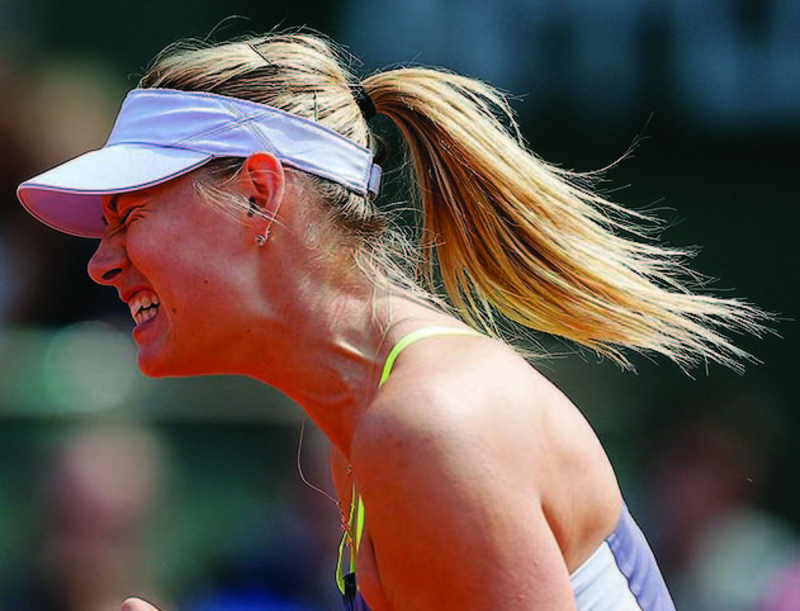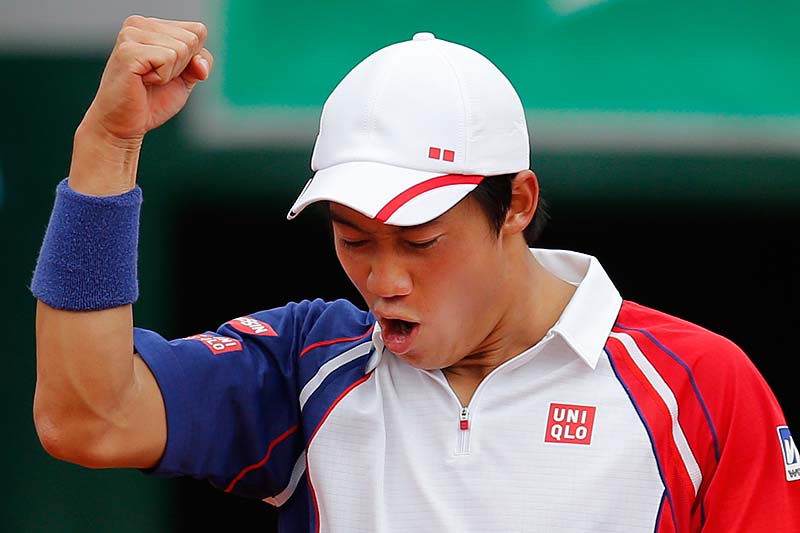“It hit the outside line,” she told the chair umpire.
He disagreed – incorrectly – but Sharapova wasn’t fazed for long. She overcame eight double-faults, the erroneous ruling and a second-set deficit to beat Zheng Jie 6-1, 7-5 in the third round Saturday at the French Open.
Sharapova completed a career Grand Slam by winning the Roland Garros title last year. She has reached the fourth round at 11 of the past 12 major events.
She’ll next play American Sloane Stephens, who reached the fourth round for the second consecutive year, beating Marina Erakovic 6-4, 6-7 (5), 6-3. Unseeded American Bethanie Mattek-Sands also advanced, beating qualifier Paula Ormaechea 4-6, 6-1, 6-3.
Like Sharapova, former No. 1 Victoria Azarenka struggled with her serve, but she rallied past Frenchwoman Alize Cornet 4-6, 6-3, 6-1.
Seeded third, Azarenka advanced despite hitting 10 double-faults and being broken six breaks. She managed a smile later when asked about her serve.
“I think I left it home today,” she said. “If I can win with serving like this, that’s pretty remarkable.”
She next plays unseeded Francesca Schiavone, the 2010 champion, who beat No. 13 Marion Bartoli of France 6-2, 6-1.
No. 13 Kei Nishikori became the first Japanese man in 75 years to reach the fourth round at Roland Garros, beating No. 24 Benoit Paire of France 6-3, 6-7 (3), 6-4, 6-1.
Sharapova found herself trailing 4-1 in the second set following the incorrect call. Facing a break point at 30-40, she hit a second serve that was ruled long.
The umpire climbed off his chair to check the mark and confirmed the call. Sharapova briefly argued in vain, contending the umpire looked at the wrong mark.
A TV replay showed her serve had hit the line. She shook off the setback, sweeping the next three games for 4-all, and broke in the final game.
While Sharapova struggled to hold, Zheng had trouble with her serve, too, landing one short of the net. She was broken in her final five service games.
Sharapova feasted in particular on Zheng’s weak second serve and went 8 for 8 on break-point chances. The Russian improved to 33-4 this year, including 14-1 on clay, and owns a best winning percentage on clay (.821) among active players.
Over on court 1, the No. 17-seeded Stephens won the last three games against Erakovic, who was penalized a point in the third set for getting coached.
A year ago, Stephens became the first U.S. teenager to reach the fourth round at Roland Garros since Serena Williams in 2001. She followed that up by reaching her first Grand Slam semifinal at the Australian Open this January, beating Williams to get there.
“This is my favorite tournament,” said Stephens, now 20, “so I would really, really, really love to win this tournament. But that’s a long shot.”
The center court stands were half-empty on a cloudy, mild day for Azarenka’s match. Crowds will likely be bigger for her next week, and so will the stakes.
“Center court is something that motivates me every time I walk on court,” she told the crowd after her victory, “and I can’t wait to be back here.”
She blew an easy overhead to lose the first game of her final set, then swept the last six games thanks to relentless baseline play that wore Cornet down.
“She’s a machine, a juggernaut,” Cornet said.
Azarenka said she altered her approach in the second set and became more aggressive.
“I really took my chances moving forward,” she said. “That’s what was bringing me the points and the victory in the end.”
Azarenka has won the Australian Open each of the past two years. Roland Garros is the only major tournament where she has yet to reach the semifinal.
Cornet, seeded 31st, stumbled and fell at the start of the second set and was slow to rise. She was unhurt but lost her composure as the match slipped away, screaming at herself between points and once spiking two balls in anger.
“I dropped one or two games, but that’s enough for your head to go under the water,” Cornet said.
Like Erakovic, Paire was docked a point for being coached — and at a critical time. He had a set point at 5-4 in the second set when he was given the penalty, which made the score deuce.
Paire won the set anyway but fell behind to stay when he dropped serve in the last game of the third set.
Nishikori broke serve eight times and benefited from nine double-faults by Paire. He became the first Japanese man to reach the round of 16 at Roland Garros since Fumiteru Nakano in 1938.
Send questions/comments to the editors.




Success. Please wait for the page to reload. If the page does not reload within 5 seconds, please refresh the page.
Enter your email and password to access comments.
Hi, to comment on stories you must . This profile is in addition to your subscription and website login.
Already have a commenting profile? .
Invalid username/password.
Please check your email to confirm and complete your registration.
Only subscribers are eligible to post comments. Please subscribe or login first for digital access. Here’s why.
Use the form below to reset your password. When you've submitted your account email, we will send an email with a reset code.